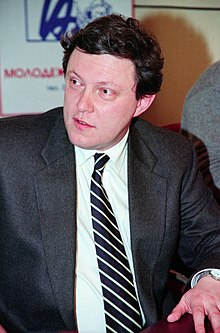Grigory Yavlinsky
| Grigory Yavlinsky | |
|---|---|
 |
|
| Deputy Chairman of the Committee on the Operational Management of the Economy of the Soviet Union | |
|
In office 24 August – 2 October 1991 |
|
| Premier | Ivan Silayev |
| Preceded by | Yury Luzhkov |
| Succeeded by | Gennady Kulik |
| Chairman of Yabloko Party | |
|
In office 1993–2008 |
|
| Succeeded by | Sergey Mitrokhin |
| Personal details | |
| Born |
Grigory Alexeyevich Yavlinsky 10 April 1952 Lvov, Ukrainian SSR, Soviet Union |
| Political party | Yabloko |
| Spouse(s) | Elena Yavlinskaya (b. 1951) |
| Children | Mikhail (b. 1971) Alexey (b. 1981) |
| Religion | Russian Orthodox |
| Website | http://yavlinsky.ru/ |
Grigory Alexeyevich Yavlinsky (Russian: Григо́рий Алексе́евич Явли́нский; Ukrainian: Григорій Олексійович Явлінський; born 10 April 1952) is a Russian economist and politician. He is best known as the author of the 500 Days Programme, a plan for the transition of the USSR to a free-market economy, and for his leadership of the social-liberal Yabloko party. He ran twice for Russia's presidency – in 1996, against Boris Yeltsin, finishing fourth with 7.3% of the vote; and in 2000, against Vladimir Putin, finishing third with 5.8%. He did not run in 2004 or 2008, after his party failed to cross the 5% threshold in the 2003 Duma elections. In 2012 presidential election he was prevented from running for president by Russian authorities, despite collecting 2 million signatures of Russian citizens for his candidacy, as was demanded by law. Yavlinsky is Yabloko party's nominee for President of Russia in the 2018 presidential election. Yavlinsky holds a Ph.D. in economics from the Central Economic Mathematical Institute of the Russian Academy of Sciences; his doctoral dissertation was entitled "The socio-economic system of Russia and the problem of its modernization." He is a professor in the National Research University Higher School of Economics. Yavlinsky speaks Russian, Ukrainian and English.
...
Wikipedia
